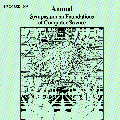One of the cornerstones of the distributed complexity theory is the derandomization result by Chang, Kopelowitz, and Pettie [FOCS 2016]: any randomized LOCAL algorithm that solves a locally checkable labeling problem (LCL) can be derandomized with at most exponential overhead. The original proof assumes that the number of random bits is bounded by some function of the input size. We give a new, simple proof that does not make any such assumptions-it holds even if the randomized algorithm uses infinitely many bits. While at it, we also broaden the scope of the result so that it is directly applicable far beyond LCL problems.
翻译:暂无翻译
相关内容
IEEE计算机科学基础研讨会(FOCS)是由IEEE计算机学会计算数学基础技术委员会(TCMF)主办的旗舰会议,涵盖了广泛的理论计算机科学。它每年秋季举行,并与每年春季举行的由ACM SIGACT赞助的姊妹会议——计算理论年度研讨会(STOC)配对。官网链接:http://ieee-focs.org/



